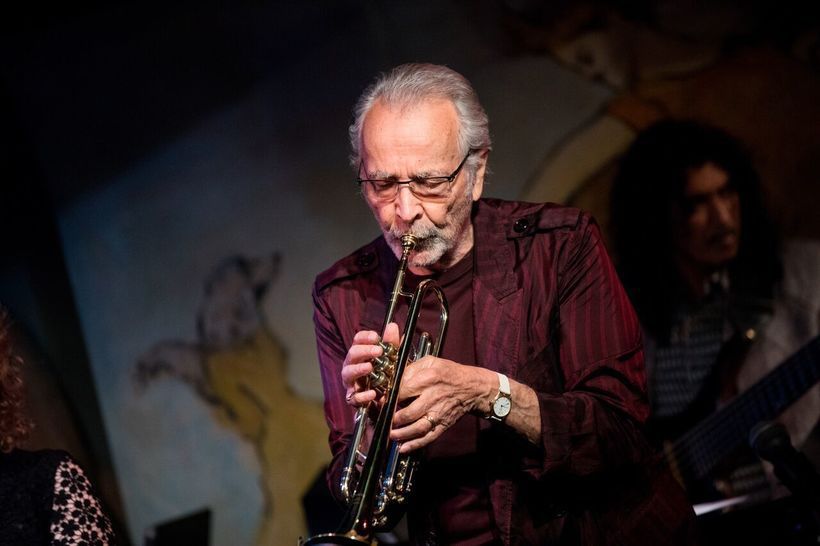Q&A: Herb Alpert’s still searching for the ‘it’ factor
Q&A: Herb Alpert’s still searching for the ‘it’ factor

Herb Alpert
Herb Alpert, world-famous trumpet player and leader of the Tijuana Brass in the 1960s, has toured in recent years with his wife Lani Hall, who sang in the group Brasil ’66, who were signed to Alpert’s A&M Records. Alpert, now 83, plays with a small group made up of bass, drums and keyboard, along with his trumpet and Hall’s vocals. The pair will perform in Missoula for the first time at the Dennison Theater Sep. 20.
When you’re not out on the road, what’s a day at home like for Herb Alpert?
Well, I blow the horn for a while and I paint and sculpt. I’m a right-brain guy, you know, so I just do that. Creativity keeps me alive.
No, not at all. I really honestly feel, without trying to fluff it up, I think creativity’s the thing that gives you energy. You don’t have to be a professional, but if you paint, you sculpt, you do something that exercises your ingenuity, I think it has a good way of keeping you alive and happy to get up in the morning.
Do you do anything to keep yourself going? I saw somewhere you practice yoga.
I did Tai Chi for a while, I studied the martial arts for a while. I try to keep my brain moving. I’m 83 now and I want to make sure the gray matter up there doesn’t atrophy.
Back in the days with the Tijuana Brass, did you guys ever go to smaller markets like Montana?
Oh yeah, we did a lot of smaller markets in the ‘60s. We used to travel around in an old DC-3 prop plane and it requires a shorter landing field. We went to a lot of remote spots that were fun to play in. People were just as excited to see us as they were in the big cities.
You guys were pretty universal in your appeal.
It was an amazing run. I feel very fortunate that I experienced that. At the height of the Tijuana Brass — I wasn’t crazy about it — some of these venues were selling tickets that were behind pillars where people couldn’t even see us.
You’re touring with a pretty small group. It sounds like you do a lot of improvisation and you don’t have set setlists. How do you like that spontaneity?
That’s what keeps me going. It’s not a cookie-cutter concert. It’s not the same way each night. It’s different each night, except I’ll do the Tijuana Brass medley and my wife Lanie will do a Brasil ’66 medley, but around that is all very loose, very improv. There’s a basic form that we adhere to, but within that structure there’s a lot of fun jazz to listen to.
Why is that important?
Like I said at the start of the conversation, I think creativity is a thing that keeps people going. It keeps me going. So every night is a little different, every night I get to exercise my own imagination and play songs that I like to play, but they come out differently each night.
You’ve talked a little bit about wanting to give people a good time and have a good vibe in the room. And you’re doing Q&A’s.
I’ll open it up for people who want to ask questions. I don’t take requests for songs, but whatever they’d like to know about, whether it’s me or they — everyone seems to have some type of attitude about the “Whipped Cream and Other Delights” album — I just try to keep it fun. Give this opportunity to give this experience for people that’s very important.
I think music’s a healer. If you go to a concert and have a song that you particularly like when it’s happening, you’re just kind of in that moment of your life and that’s all you’re thinking about. And when you’re at one of our concerts it’s taking away from your everyday life and you can be in another type of zone. I think that’s really healthy.
You’ve done dozens of covers throughout your career. How do you approach adapting pop songs to the trumpet?
I always try to bring something to a song that’s familiar with people, I try to bring a new fresh look to them. If I can do them in a way they haven’t quite been done before, that gives me a good feeling and that’s how I approach it.
Have you ever tried to cover a song that’s stumped you?
Yeah, I can’t think of the songs right now, but there have been songs where I just can’t find a way to make it feel honest. I think that’s the key. I’m loving the mystery of art, I think there’s a whole mystery attached to music, painting, sculpting, dance, poetry, whatever it is, there’s a certain little, you can’t identify what that thing is that makes you feel good when you hear it.
Have you gotten close to finding that ‘it?’
I capture it now and then. I captured it on the “Whipped Cream” album when I played “Taste of Honey,” which hadn’t been heard that way and got me a record of the year award for it.
I can tell when it’s happening. I get those goosebumps myself when I play a song that is surrounded by something really interesting, an interesting arrangement that feels good to play. I get that feeling.
I’m not doing this for the reasons of trying to make as much money as I can. I try to make good records and that’s been my pursuit since the start of my career in 1962. I never tried to make a record that I think people are going to love. If I love it, I feel there’s maybe a few other people that my like it. That’s always the way I’ve approached music.
You’ve been correct — clearly other people do love it.
Yeah, sometimes more correct than other times. It’s a fun pursuit, I think that’s what it is. Dizzy Gillespie was a good friend of mine, and Dizzy used to say “the closer I get, the farther it looks.” I like that saying.
Have you had any points in your career where you’ve felt like you were tired with music or weren’t finding that magic in music?
I went through that in 1969, ’70, ’71. All of a sudden I couldn’t play the trumpet the way I wanted to. I was going through a divorce and was emotionally not happy. It manifested itself through the instrument. So it took me a while to get back on track. But my good friend the trumpet, that I started playing when I was 8 years old, all of a sudden turned on me, became an enemy.
How did you find your way back from that?
I took lessons from a teacher in New York who had the reputation — he was called “the troubleshooter,” so he used to teach musicians from all different parts of the wordl who were having problems.
What he did, he taught me the physics of the instrument. I never thought about that before. What actually happens when you make a sound out of the horn and how do you get more with less effort? That was well worth the problems I was going through.
Was that a humbling experience? Taking lessons after all your success in the ’60s?
I don’t need anything to be more humble than I am. I feel very fortunate. I know I’ve been very lucky. I’ve been prepared, I know I have a talent, but you have to be at the right place at the right time. And some people are extremely talented and never get that opportunity to be at the right place at the right time. I don’t take anything for granted, I’m very thankful for what’s happened in my career.
Do you still use, or still have your trumpet that you used, that you recorded songs like “The Lonely Bull” on?
I have that trumpet in the closet. I’m using another instrument in concerts. The Smithsonian wanted to have that trumpet and I’m going to give it to them one of these days.
But, to your last question, when I was studying with that teacher who was teaching me the physics of playing the instrument, I thought maybe the instrument was one of the problems — my mouthpiece was the problem, maybe I was playing the wrong horn. He looked at my instrument and said, “Man, let me tell you something. That thing you’re holding in your hand, it’s just a piece of plumbing. You’re the instrument. You want to make music it has to come out of you.”
That was just another way of approaching it.
Earlier this summer marked the 50th anniversary of the release of “This Guy’s in Love with You.” How do you feel about that song now?
I like the song, it’s a good song. It came about by almost an accident that I had this number one record. We were doing a TV show at the time. I did that song on the show, two weeks later it was number one in the country. I understand why. It’s a great song, it’s a great arrangement that Burt Bacharach did for me. The circumstance of the show kind of just catapulted it. That’s another thing were you’ve gotta be in the right place at the right time. That song had the right audience at the right time and it all worked.
It didn’t convince you that you should start singing regularly?
I never thought of myself as a vocalist. I like to play the horn. I have my own identity on the trumpet. Miles Davis said, “you hear three notes and you know it’s Herb Alpert.” That’s quite a compliment.
I can carry a tune and I can carry a feel. I think all music is about feel, it’s not about anything else. It’s not about in tune, out of tune. The only thing that people respond to is a feeling, and that goes for, I think, all of the arts. That’s very subjective – what feels good for one person might not feel good for another, but I think there’s a certain universal thing that resonates. People don’t listen with their ears, I think people listen with their soul. When something strikes you, something resonates in your soul.

